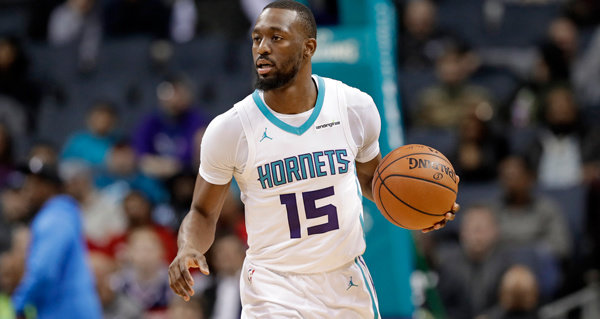Kemba Walker. That's how the offseason for the Charlotte Hornets begins and ends. It’s simultaneously both that simple and that complicated. Walker has been their franchise player for eight seasons now and Charlotte has made the postseason just twice during that stretch. As an unfortunate side effect of Walker’s play, the Hornets haven’t been bad enough to add a second franchise player as they’ve won between 33 and 48 games each of the past six seasons.
That’s the crux of the Walker question for Charlotte. He’s really good, but he’s also a small guard who just turned 29 years old. Despite Walker’s individual brilliance, the Hornets have kind of maxed out as a decidedly below-average team. After he made the All-NBA Third Team this year, the question that immediately came to mind is: can you commit to Walker for the next five seasons and over $221 million? That’s really difficult to answer.
The Hornets have utterly no way to replace Walker if he leaves in free agency. They’re still capped out for at least another year or two, due to contracts the team signed for players who were part of the franchise’s last playoff push in 2016. If Walker doesn’t re-sign, Charlotte would become a really expensive team with overpaid veterans that projects to be in the lottery for at least another year or two.
On the other hand, Walker has never expressed anything but love for the only NBA home he’s ever known. He’s continually said all the right things and was honored to represent the Hornets at last year’s All-Star festivities in Charlotte. Playoff success notwithstanding, Walker is in some ways the Eastern Conference counterpart to Damian Lillard in that he’s in a smaller market but genuinely seems to love being there.
And, like Lillard, Walker is really, really good. He’s coming off a career-best scoring season at 25.6 points per game along with a career-best PER of 21.8. He’s solid playmaker and also a better rebounder than you think. Again, like Lillard, Walker is exactly the kind of guy you want to be the face of your franchise. And, finally, both players are eligible for a so-called super-max contract.
But that’s where the comparisons to Lillard’s situation end. Lillard has been on constant winners. Sure, Portland overpaid for players during the 2016 cap spike as Charlotte did, but they managed to hit on the right mix. For the past two seasons, Walker has been the Hornets sixth-highest paid player at the relative bargain of $12 million per season on his pre-cap spike extension. While he’s never publicly complained about that even once, it’s something that hasn’t gone unnoticed around the NBA.
Combine all of those factors and both parties have a tough decision to make. Does he want to re-sign and face the prospect of at least two more seasons with largely the same roster? Do the Hornets want to commit a large chunk of the salary cap to Walker on a deal that will run to his mid-30s? It’s possible they could choose to split the difference to some extent. There is nothing that says qualifying for the super max means that is the only contract you can sign. But even taking slightly less leaves Charlotte with a bloated cap sheet.
Part of what is making that cap sheet so bloated are player options for Marvin Williams, Michael Kidd-Gilchrist and Bismack Biyombo. Biyombo has already exercised his $17 million option for next season, while Williams and Kidd-Gilchrist are expected to do the same for $15 million and $13 million respectively. Any one of those deals, even two of those deals, wouldn’t be a killer, but all three for a combined $45 million is really hard to work around.
Making things even trickier for the Hornets are the big contracts for Nic Batum ($25.5 million) and Cody Zeller ($14.5 million). While Biyombo, Kidd-Gilchrist and Williams all expire after this coming season, Batum and Zeller are still on the books for a combined $42.5 million for 2020-21. Add another $41 million for Walker and you’ve used around 80 percent of your cap on three players. That’s not really a tenable situation for anyone outside of the Warriors.
Further complicating things is that Charlotte has yet to receive meaningful contributions from their recent draft picks. Malik Monk and Miles Bridges have been fine as late-lottery picks, but neither is projecting towards being anything beyond low-end starters or rotation players. Not having young, cost-controlled talent to balance the big contracts has compounded the situation.
As for the team’s non-Walker free agents, with Kidd-Gilchrist and Williams expected to opt in, that leaves the only decision-points as Jeremy Lamb and Frank Kaminsky. Lamb is coming off a career-year and is now in his late-20s. This could be his best/last chance at an eight-figure per year contract. Given he fills a role as a valuable bench wing/spot starter, the bidding could rapidly get beyond a point where Charlotte can match.
Kaminsky seemed like a much easier decision early last season. He was out of the rotation and at one point looked like a trade candidate. After several injuries up front, Kaminsky got back in the mix and played well down the stretch. With bigs who can stretch the floor en vogue around the NBA, Kaminsky could be a fallback option for teams that miss out on the Brook Lopez types. Like Lamb, Kaminsky could get too expensive for the Hornets to consider keeping.
That leaves things in a place where it’s easy enough on its face: re-sign Walker and more or less run it back. Hope for better luck with injuries, improvement from the younger players and bounce-back years for the veterans. But it’s not really that easy as this summer’s decisions will have impacts far beyond this coming season.
Offseason Details
Guaranteed Contracts (6): Nicolas Batum, Bismack Biyombo, Miles Bridges, Devonte Graham, Malik Monk, Cody Zeller
Partial/Non-Guaranteed Contracts (3): Dwayne Bacon, Willy Hernangomez, Tony Parker
Potential Free Agents (8): Joe Chealey (RFA – Two-Way), Frank Kaminsky (RFA), Michael Kidd-Gilchrist (UFA – Player Option), Jeremy Lamb (UFA), Shelvin Mack (UFA), J.P. Macura (RFA – Two-Way), Kemba Walker (UFA), Marvin Williams (UFA – Player Option)
“Dead” Money on Cap ($0): None
First Round Draft Pick(s): #12
Maximum Cap Space: $37.4 million
Projected Cap Space: None. $40.1 million over



